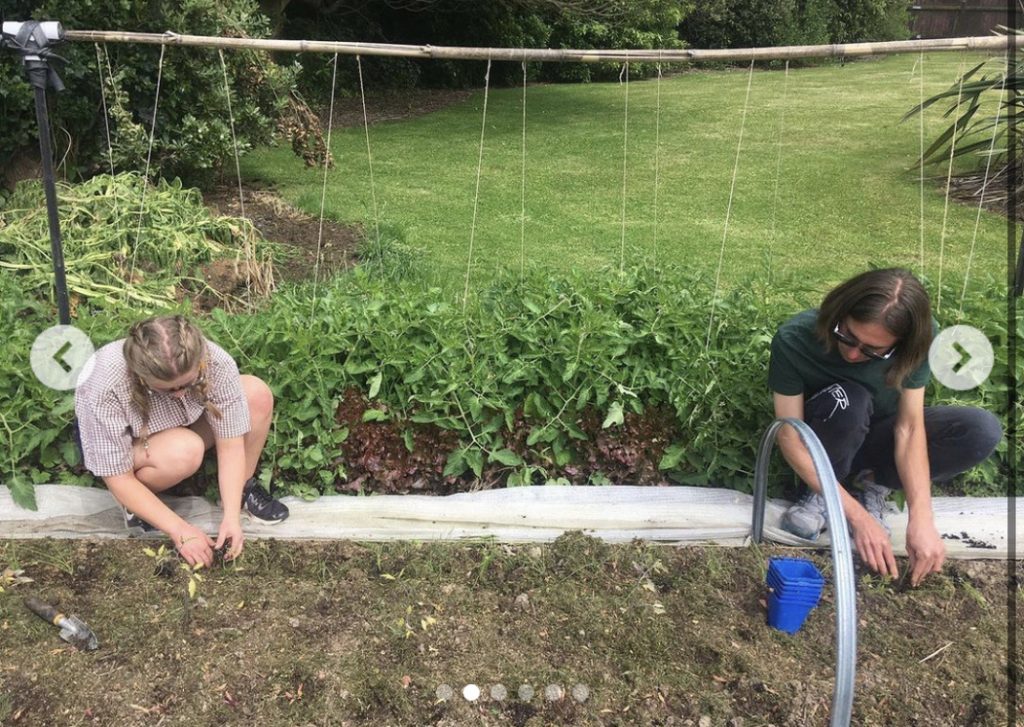author
Jacques Lawinski
post
- 15/01/2023
- No Comments
- Stories
share
What emotions arise when we are gardening? What can we learn about ourselves and the environment?

I put my hands into the clay-brown soil, making a small hole for the tomato plant. Gently pushing the soil to either side of the hole, I ensure there is enough space for the new inhabitant in this patch. Once the hole is deemed sufficient, the tomato plant gently comes out of the small pot where it is beginning to wither, and I place it into the hole, pressing gently on the top soil. Taking some of the surrounding soil, I spread it around the plant, filling in the edges of the hole. Finally, a little bit of mulch on top – to make sure the soil doesn’t dry out too much – I’m told.
On to the next one, the same procedure, just a little further down the line. We’re making a row of tomato plants here, evenly spaced along the narrow mounds of soil, which are separated by channels where we are allowed to place our feet. We all wear shoes, however – the unexpected danger always lurking in the community garden, whether it be glass, an old gardening tool, or something more foreign. Next to the tomato plants are the spring onions, little grass-like tufts which will grow into hollow green shoots with white stems.
My companions are a lovely bunch – from different backgrounds, workplaces, and ages, each with a different story to tell. We ask questions to each other, slowly probing at the history which creates us, and gradually weaving a new story in which we are all featured. Tastes and preferences are good questions; shoe sizes and basketball soon follow, but the money shot of political and philosophical opinions never ceases to generate fascinating moments of shared connection.
The garden feels our warmth as we share in its creation. Our hands, collectively planting new fruits and vegetables into Mother Nature’s bountiful skin, energise these little seedlings, giving them a boost, gently courting them, encouraging them to grow. We will not know, after this moment, which ones were our’s and which ones our neighbour’s, but this doesn’t bother us. Each is trusted to give the same quality of planting, without teaching or instruction. We all just know how to give a good life to these plants.
As we work, the soil slowly sticks to my fingers, around the nails and into the palms. It is as if nature wants to plant me, too; to give me a chance to grow with her help. And I let her, I need not worry about washing or cleaning, but as the plants get larger, I dig down deeper into the earth, extracting more soil to make a larger hole. The seed mix feels different to the clay-like soil in the ground, and I wonder what the roots will think of this change. Will it be like moving to another country, where everything is different, and one must learn to adapt? Or do roots sense that something is different, and pull out the knowledge they need to grow in different soils?
Gardening shows us that we can take care of our environment. It is also a way for us to take care of ourselves. We imagine the efforts of the past season when it comes time to harvest and eat our vegetables, taking the time to taste the flavour of the tomatoes and courgettes; getting to know them as vegetables, rather than in a tomato sauce. We also feel the satisfaction of having cared for and nurtured our food, and all the nourishment we gave to the plant, we can now take back for ourselves. And so the cycle of gardening continues.
Our stories present new ideas, new thinking. They will always be open and free for everyone to read, without any advertising.
All our articles are freely accessible because we believe that everyone needs to be able to access to a source of coherent and easy to understand information on the ecological crisis. Through new ideas, we can think differently about our daily experiences, and begin to change the way we interact with our environment.
If you've learned something today, or feel inspired, please consider donating, to help us produce more great stories and share this knowledge with a wider audience.
Why plurality.eco?
Our environment is more than a resource to be exploited. Human beings are not the ‘masters of nature,’ and cannot think they are managers of everything around them. Plurality is about finding a wealth of ideas to help us cope with the ecological crisis which we have to confront now, and in the coming decades. We all need to understand what is at stake, and create new ways of being in the world, new dreams for ourselves, that recognise this uncertain future.

